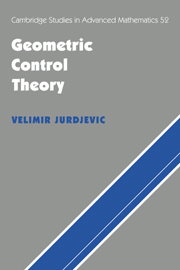Crossref Citations
This Book has been
cited by the following publications. This list is generated based on data provided by Crossref.
Bloch, A.M.
and
Crouch, P.E.
1997.
Optimal control and the full Toda flow.
Vol. 2,
Issue. ,
p.
1736.
Spindler, Karlheinz
1998.
Optimal control on Lie groups with applications to attitude control.
Mathematics of Control, Signals, and Systems,
Vol. 11,
Issue. 3,
p.
197.
Sussmann, H. J.
1999.
Mathematical Control Theory.
p.
140.
Jurdjevic, V.
1999.
Mathematical Control Theory.
p.
227.
Colonius, Fritz
and
Kliemann, Wolfgang
1999.
Stochastic Dynamics.
p.
181.
Bloch, Anthony M.
and
Crouch, Peter E.
1999.
Mathematical Control Theory.
p.
268.
Sachkov, Yu. L.
2000.
Controllability of invariant systems on lie groups and homogeneous spaces.
Journal of Mathematical Sciences,
Vol. 100,
Issue. 4,
p.
2355.
Guerra, Manuel
2000.
Nonlinear control in the Year 2000.
Vol. 258,
Issue. ,
p.
409.
Tabuada, Paulo
and
Pappas, George J.
2001.
Hybrid Systems: Computation and Control.
Vol. 2034,
Issue. ,
p.
501.
Caillau, Jean-Baptiste
and
Noailles, Joseph
2001.
Coplanar control of a satellite around the Earth.
ESAIM: Control, Optimisation and Calculus of Variations,
Vol. 6,
Issue. ,
p.
239.
Malisoff, Michael
2001.
Viscosity Solutions of the Bellman Equation for Exit Time Optimal Control Problems with Non-Lipschitz Dynamics.
ESAIM: Control, Optimisation and Calculus of Variations,
Vol. 6,
Issue. ,
p.
415.
Altafini, Claudio
2002.
The reachable set of a linear endogenous switching system.
Systems & Control Letters,
Vol. 47,
Issue. 4,
p.
343.
D'Alessandro, D.
2002.
The optimal control problem on SO(4) and its applications to quantum control.
IEEE Transactions on Automatic Control,
Vol. 47,
Issue. 1,
p.
87.
Spindler, K.
2002.
Motion planning via optimal control theory.
p.
1972.
Lynch, Kevin M.
and
Murphey, Todd D.
2003.
Control Problems in Robotics.
Vol. 4,
Issue. ,
p.
39.
Mezic, I.
2003.
Controllability of hamiltonian systems with drift: action-angle variables and ergodic partition.
Vol. 3,
Issue. ,
p.
2585.
Chelouah, A.
and
Chitour, Y.
2003.
On the motion planning of rolling surfaces.
Forum Mathematicum,
Vol. 15,
Issue. 5,
Boscain, U.
and
Chitour, Y.
2003.
Time optimal synthesis for a so(3)-left-invariant control system on a sphere.
Vol. 3,
Issue. ,
p.
2740.
Verriest, E.I.
2003.
Regularization method for optimally switched and impulsive systems with biomedical applications.
Vol. 3,
Issue. ,
p.
2156.
D’Alessandro, Domenico
2003.
Multidisciplinary Research in Control.
Vol. 289,
Issue. ,
p.
73.





